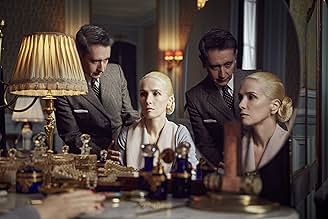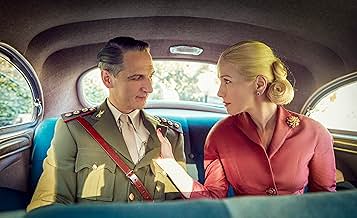IMDb RATING
6.8/10
1.1K
YOUR RATING
The sometimes near surreal and always significant fate of Eva Perón's body after her death in 1952 as it awaited burial for decades.The sometimes near surreal and always significant fate of Eva Perón's body after her death in 1952 as it awaited burial for decades.The sometimes near surreal and always significant fate of Eva Perón's body after her death in 1952 as it awaited burial for decades.
- Awards
- 14 wins & 11 nominations total
Browse episodes
Featured reviews
If you are looking for a series that chronicles Evita's full life, this is not it, this series is not a biographical series, but a fiction about what happens after Evita dies. The story starts with Evita's death and we see events that lead to her embalmed body's disappearance for almost 20 years. This is one of the three story lines, the second one focuses on journalist Mariano in 1970's trying to figure out where is Evita's body. And the final storyline are flashbacks from Evita's life - showcasing the most important events from her life; her childhood, her career as a radio actress, her meeting with Perón, her short bud powerful political career and her illness and death. The storytelling is absolutely superb and keeps you thinking what happens next.
Natalia Oreiro as Evita delivers the strongest performance of her career and presents us powerful Evita, who however does not loose human side. The series has fantastic cast of the highest quality, the music is stunning and so are the decorations and costumes.
If you are looking for a thriller, you are in for a ride, and if you are looking for a historical series, this is also for you, but I recommend to check some of the events on-line to fully understand the context of the historical events in Evita's and Perón's lives.
"Santa Evita" is a historical drama series of the highest quality and is the best fiction Argentina has to offer these days.
Natalia Oreiro as Evita delivers the strongest performance of her career and presents us powerful Evita, who however does not loose human side. The series has fantastic cast of the highest quality, the music is stunning and so are the decorations and costumes.
If you are looking for a thriller, you are in for a ride, and if you are looking for a historical series, this is also for you, but I recommend to check some of the events on-line to fully understand the context of the historical events in Evita's and Perón's lives.
"Santa Evita" is a historical drama series of the highest quality and is the best fiction Argentina has to offer these days.
Santa Evita contains all those elements that make a successful mini-series: an excellent cast, a strong and passionate story, great cinematography and direction, and a great soundtrack.
Natalia Oreiro, with a flawless performance, gives life to perhaps the best Evita Peron we have seen so far on television and cinema. The series presents a more humane and truer approach to the first lady of Argentina and it achieves its goal through the multifaceted interpretation of the protagonist, who manages to render precisely and without succumbing to imitation the changes in attitude, movements, and voice of Evita through time until the end of her life. From the rest of the performances, Ernesto Alterio stands out with a dark character interpreted as perfection.
Santa Evita is not a biography and should not be judged as such. It's an incredible, dark journey full of passion and tension that nevertheless deals with issues that are still connected with our society.
Natalia Oreiro, with a flawless performance, gives life to perhaps the best Evita Peron we have seen so far on television and cinema. The series presents a more humane and truer approach to the first lady of Argentina and it achieves its goal through the multifaceted interpretation of the protagonist, who manages to render precisely and without succumbing to imitation the changes in attitude, movements, and voice of Evita through time until the end of her life. From the rest of the performances, Ernesto Alterio stands out with a dark character interpreted as perfection.
Santa Evita is not a biography and should not be judged as such. It's an incredible, dark journey full of passion and tension that nevertheless deals with issues that are still connected with our society.
This story is not only enchanting, but it makes you wonder what is real and what is fiction. And the answer might surprise you.
Natalia's acting shines as she plays Evita from her years as a radio actress wannabe to her latest days.
The whole historical reconstruction is spotless and it leaves you unsettled but wanting more.
Natalia's acting shines as she plays Evita from her years as a radio actress wannabe to her latest days.
The whole historical reconstruction is spotless and it leaves you unsettled but wanting more.
10barbozil
Natalia Oreiro convincingly brilliant, very well resembled every period of the story, the characters well chosen on the cast, the very best picture about Eva till today.
Evita's very existence and all it symbolically meant is intolerable for the Argentine elite. The "Argentine hate" is an elite hate, a right-wing hate, hate with a clear and precise purpose: to block, limit, reduce and if possible exterminate (in the absolute sense of the term) the expressions of the
popular struggles. The series follows the seizure of the corpse of First Lady Argentina Eva Peron, for the people who loved her Evita, after her remains were embalmed and then exposed to the public for three years for a final farewell. Her remains, however, were stolen by the civilian-military dictatorship called "revoluciòn libertadora" and never returned nor placed in the family tomb.
It is precisely on the body of Evita / Donna that unfolds the myth that grew around it for over two decades. After a military coup in Argentina in 1955 overthrew the then president Juan Domingo Perón, Evita's corpse was hidden for 16 years to prevent it from becoming a symbol against the civic-military regime. A singular, unique, and at times surreal episode, which contributed to the creation of a further legendary aura around the figure of Evita for a woman who literally managed to go beyond her own death, in the everlasting memory of the Argentine and world people.
Anti-Peronism, the National-Catholic reactionaries, could not have Eva Perón celebrated as a saint, but all this work done for the concealment of the corpse had the opposite effect. In a non-chronological and non-linear narrative, Evita's life is told: orphaned by her father, at 15 she leaves everything and goes to Buenos Aires to try to break into the world of entertainment. She first became an actress, then a political and philanthropist, after the fortuitous meeting with the then colonel Juan Domingo Perón. The narrative moves back and forth, with pills and moments to reconstruct that fascinating and complex puzzle that was Evita's existence, as the title demonstrates, punctual and built on the body of the "b-word" as the big landowners oligarchs together with their military lackeys called her. The performers are never inclined to exasperate acting as often happens in Spanish language productions and offer some really suggestive sequences, like a scene that recalls the sanctity of the woman in the eyes of the people, given that she has always fought for their rights being also trade unionist.
It is precisely on the body of Evita / Donna that unfolds the myth that grew around it for over two decades. After a military coup in Argentina in 1955 overthrew the then president Juan Domingo Perón, Evita's corpse was hidden for 16 years to prevent it from becoming a symbol against the civic-military regime. A singular, unique, and at times surreal episode, which contributed to the creation of a further legendary aura around the figure of Evita for a woman who literally managed to go beyond her own death, in the everlasting memory of the Argentine and world people.
Anti-Peronism, the National-Catholic reactionaries, could not have Eva Perón celebrated as a saint, but all this work done for the concealment of the corpse had the opposite effect. In a non-chronological and non-linear narrative, Evita's life is told: orphaned by her father, at 15 she leaves everything and goes to Buenos Aires to try to break into the world of entertainment. She first became an actress, then a political and philanthropist, after the fortuitous meeting with the then colonel Juan Domingo Perón. The narrative moves back and forth, with pills and moments to reconstruct that fascinating and complex puzzle that was Evita's existence, as the title demonstrates, punctual and built on the body of the "b-word" as the big landowners oligarchs together with their military lackeys called her. The performers are never inclined to exasperate acting as often happens in Spanish language productions and offer some really suggestive sequences, like a scene that recalls the sanctity of the woman in the eyes of the people, given that she has always fought for their rights being also trade unionist.
- How many seasons does Santa Evita have?Powered by Alexa
Details
- Release date
- Country of origin
- Language
- Also known as
- Santa Évita
- Filming locations
- Palacio Sans Souci, Buenos Aires, Federal District, Argentina(presidential residence)
- Production companies
- See more company credits at IMDbPro
Contribute to this page
Suggest an edit or add missing content

































